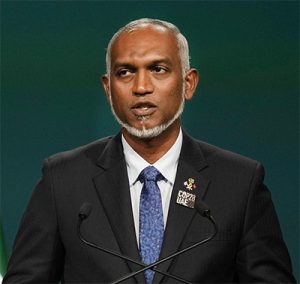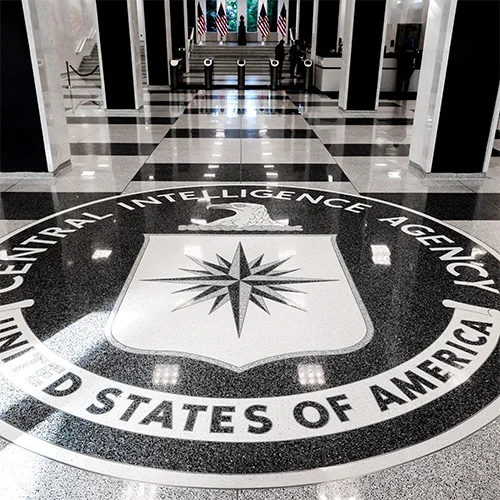Midweek Review
Prez poll: External factors and Maldivian leader’s dilemma
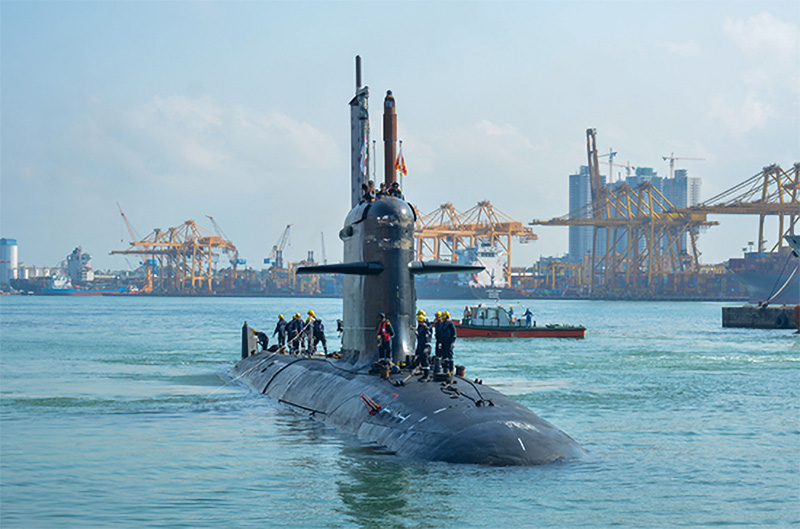
President Mohamed Muizzu
India steps up pressure on the Maldives with unprecedented harassment of Maldivian fishers within the Maldivian economic zone. Obviously, the nuclear power piqued by the Maldivian request to withdraw its military contingent by March 15, this year wants to intimidate the much smaller neighbour. The international community shouldn’t turn a blind eye to such bullying tactics. Now that the Maldives asked for an explanation from India why its Coast Guard personnel boarded three Maldivian fishing vessels operating in Maldivian waters, it would be Delhi’s responsibility to address the neighbour’s concerns. Regardless of New Delhi’s response, the Indian Coast Guard wouldn’t have boarded Maldivian vessels unless they were directed to do so. Perhaps the Indian Coast Guard should deploy some of its assets to thwart hundreds of their fishing craft crossing the Indo-Lanka maritime boundary as Indian poaching threatens the livelihood of Sri Lankan Tamil fishermen.
By Shamindra Ferdinando
The Maldives wants Indian military personnel out of its soil by 15th of March this year. India is determined to continue the deployment, though new Maldivian President Mohamed Muizzu, 45, appears to be firm in his decision to oust foreign military personnel, announced on January 14, immediately after his return from China.
Muizzu’s move reminded us of the late President Ranasinghe Premadasa’s demand for speedy withdrawal of the Indian Army, deployed in North and East of Sri Lanka. India eventually pulled out its troops by March 1990 although Premadasa’s deadline was ignored.
Compared to the Indian deployment in Sri Lanka, the Indian military presence in the tiny Indian Ocean archipelago nation is insignificant. The total deployment consisted of altogether 77 personnel assigned for the operation of two Dhruv Advanced Light Helicopters (ALHs) and one Dornier maritime surveillance aircraft.
Subsequent reports indicated that India may withdraw its military contingent by May 10, this year.
The Maldives took delivery of two ALHs in 2010 and 2017 during the tenure of President Mohamed Nasheed, whereas the Dornier was positioned there in late 2020, the year the US and the Maldives signed, what they called, a framework for U.S. Department of Defence-Maldives Ministry of Defence to have a Defence and Security Relationship.
Rezaul H. Laskar, the Foreign Affairs Editor at Hindustan Times, in an online report, dealt with the latest deployment. Laskar quoted those familiar with the developments as having said the Indian move was meant to maintain a closer watch on Chinese naval movements.
There cannot be absolutely no doubt regarding Indian intentions in line with its overall strategy to meet the Chinese challenge. The leasing of two Dornier aircraft to the Sri Lanka Air Force by India, after the change of government here in July 2022, is of significant importance.
The placement of Dornier took place during the tenure of President Ibrahim Solih, whose pro-Indian policy boomeranged on him as China backed Muizzu, of the People’s National Congress, who campaigned to end the Indian military presence in his country. The much touted ‘India out’ campaign attracted the majority of the Maldivians.
Muizzu won the Sept 2023 presidential election in the Maldives after a second-round run-off against Solih.
In spite of Muizzu offering to visit New Delhi, in Dec 2023, following his Nov 17 inauguration, the Modi administration turned its back on him. Our President Ranil Wickremesinghe and First Lady Maithree attended the inauguration. Having been snubbed by India, Muizzu undertook his first official visit to Turkey and then the United Arab Emirates (UAE) where he attended the United Nations Framework Convention on Climate Change (COP28) in Dec 2023, before flying to Beijing, the following month.
The Maldivian media declared that Wickremesinghe was the highest-ranking state official at the event whereas India was represented by a Minister. It would be pertinent to mention that no less a person than Narendra Modi attended the inauguration of Solih in Nov 2018, while Sri Lanka was represented by Dr. Sarath Amunugama, the then Foreign Affairs Minister of the 52-day Maithree-Mahinda government, subsequently dismissed by the Supreme Court.
The simmering India-Maldives dispute, over the latter’s demand for the withdrawal of the Indian military contingent, has obviously promoted Indian External Affairs Minister Dr. S. Jaishankar to suggest to his countrymen and women, “My first advice to you, the next time you want to take a holiday, go to Sri Lanka. I’m serious. Please go to Sri Lanka. I say this to all of you.”
This declaration was made late last month and should be examined against the backdrop of the diplomatic row caused by Premier Modi just ahead of Muizzu’s State visit to Beijing. Modi’s unprecedented move to promote Indian islands of Lakshadweep as a tourist destination, at the expense of the Maldives, heavily dependent on tourism, triggered an angry reaction from the smaller country. Muizzu has had no option but to sack three State Ministers who have been critical of Modi.
India actively encouraged boycotting of the Maldives while the latter expressed confidence the crisis could be addressed by Chinese tourists. The Indian reaction proved one thing that even tourism can be weaponized against a smaller nation.
The stakes are so high and the situation moving rapidly, it is not so difficult to realize the Maldivian Opposition wants to impeach Muizzu. Sri Lanka shouldn’t respond indifferently as the country faced the same predicament as the Maldives.
The attempt by Indian-trained Sri Lanka terrorists to assassinate the Maldivian President Gayoom, in Nov 1988, underscored how the Indian terrorism project undermined regional peace.
Lessons for Lanka
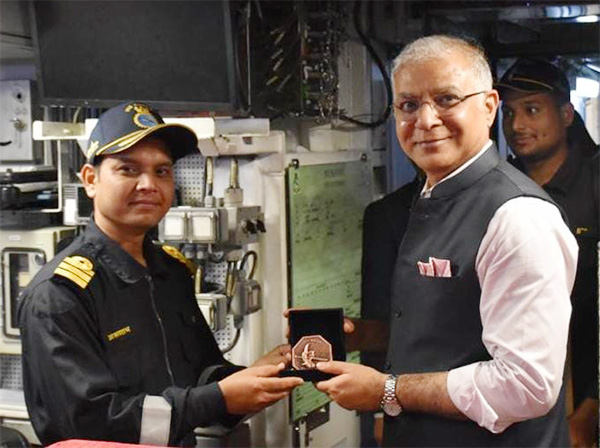
Indian HC Santosh Jha visits INS Karanj, the third of the Kalveri class submarines, commissioned into the Indian Navy on 10 March 2021.
With the local presidential election just a couple of months away, let us examine how China and the US-led group pressure Colombo as regards its foreign policy. Modi’s India remains a staunch US ally though New Delhi wouldn’t support Washington in its kind of proxy war in Ukraine. Therefore, the US and India policy vis a vis Sri Lanka is certain to be common and their approach in respect of Chinese ‘presence’ here, too, is compatible.
The joint US-India opposition to Chinese research vessel’s visits to Sri Lankan ports is a case in point. Their pressure is such the Wickremesinghe-Rajapaksa government was literally forced to suspend Chinese research vessel’s visits this year. Like in the Maldives, US-India vs China battle is certain to be a major issue in the run-up to the presidential poll with none of the major contenders, UNP (United National Party) leader Wickremesinghe, SJB (Samagi Jana Balawegaya) leader Sajith Premadasa and JJB (Jathika Jana Balawegaya) very much likely to refrain from anti US-India or anti-China rhetoric.
The recent unprecedented five-day visit undertaken by JVP and JJB leader Anura Kumara Dissanayake to New Delhi should be examined against the backdrop of AKD’s tour of the US a couple of months ago.
Sri Lanka is in such a precarious situation, economically, no party/coalition can antagonise China or the US-India grouping. Whoever wins the next presidential poll will have to tread cautiously or face the consequences. Sri Lanka is indebted to both China and India with the latter often reminding Sri Lanka how it saved the country during the 2022 economic-political-social crisis after Washington and Delhi possibly hatched it, clandestinely, as alleged by National Freedom Front (NFF) leader Wimal Weerawansa, especially with the ‘peaceful’ protest movement that catapulted into a deadly force, overnight, on May 09, last year, torching houses of governmentt politicians, across the country, with meticulous intelligence, in a matter of few hours, as the security forces and police watched in silence. That is the ground reality.
China taught Sri Lanka a bitter lesson after the then Premier suspended the flagship China-funded Colombo Port City project immediately after the 2015 presidential election. China also reacted angrily, in late 2016, after the then Finance Minister Ravi Karunanayake falsely accused Beijing of providing costly loans to the Rajapaksas.
Finally, China secured the strategic Hambantota Port in 2017, with 85% stake, thereby consolidating its position in the port sector. As to how many palms were oiled for its success we may never know. The Chinese influence cannot be examined without taking into consideration Colombo International Container Terminals (CICT) Limited, a joint venture between SLPA and China Merchants Port Holdings Company Ltd, a listed blue chip company in the Hong Kong stock exchange.
Let me stress that the CICT agreement is valid for a period of 35 years, the Hambantota contract is nothing but a sellout as it is on a 99-year lease.
Over the years China expanded its operations and influence – both during the conflict and after as the Communist Party enhanced its hold on the then Sri Lankan political leadership. But China has been a steady friend, who has always stood by us, especially in our fight to overcome terrorism here. It never wavered and was a friend in need.
Shiv Shankar Menon, one-time Indian Foreign Secretary and National Security Advisor, in ‘Choices’, extensively dealt with the Chinese influence on Sri Lanka’s relations with India. Unfortunately, Menon, like so many others, tends to discuss the issues at hand, quite conveniently forgetting how India created an opening for China, in Sri Lanka, by launching a terrorist war. China ended up being Sri Lanka’s primary weapons supplier, including state-of-the-art radar installed at the height of the war against the LTTE.
However, one shouldn’t forget at that time India considered US and Israeli support for Sri Lanka a serious threat to their security. A few decades later, the US and Israel are perhaps India’s closest allies, with political and military ties at the highest level. The US refusal, in March 2005, to issue a diplomatic visa for the then Gujarat Chief Minister Modi over his alleged complicity in anti-Muslim violence in his State, three years before, is a thing of the past.
US advice
At the forthcoming presidential election, followed by parliamentary polls here, the US-India combine will seek to consolidate gains they made in the wake of Gotabaya Rajapaksa’s ouster in July 2022. But Modi should not forget how fickle the Western pale faces are as at one time, in the Kissinger era, Beijing was their darling, in order to even scores with Moscow.
Such are the vagaries of world politics – no permanent friends and no permanent enemies, only permanent interests!
Speaker Mahinda Yapa Abeywardena never bothered to challenge National Freedom Front (NFF) leader Wimal Weerawansa’s declaration (first made in April 2023) that US Ambassador Julie Chung personally intervened on July 09, 2022, to arrange transfer of executive powers to Abeywardena. They seemed to be comfortable with the incumbent administration and may push the Tamil National Alliance (TNA) to align with President Wickremesinghe, who is now certain to secure the backing of a significant number of SLPP lawmakers unless that party officially backed him. Many SLPPers are still having jitters they got on the night of May 09 last year when some of their life possessions were torched in a matter of few hours and that is the hard truth.
CWC leader Jeewan Thondaman, in spite of being elected on the SLPP ticket at the last general election, had no qualms in declaring his intention to throw his party’s weight behind Wickremesinghe at the forthcoming presidential contest. Both the TNA and the CWC are sure to be influenced by India as they did on many previous occasions.
The 2010 US bid to have war-winning Army Commander General Sarath Fonseka elected as the President underscored the extent to which foreign powers can interfere in smaller countries’ national elections. The US bid failed due to the South rallying around the then incumbent President Mahinda Rajapaksa though Fonseka comfortably won all predominantly Tamil speaking districts in the Northern and Eastern regions. Rajapaksa polled over 1.8 mn votes more than Fonseka whose side (the alliance that fielded Fonseka consisted of UNP, JVP, TNA and SLMC) foolishly accused the winner of computer jilmaat.
Recently, US Ambassador Julie Chung commented on the forthcoming presidential election. The comment was made at Amcham CXO Forum “75 years and Beyond: U.S.–Sri Lankan Business Relations in 2024.”
Emphasizing the need for proper political leadership to overcome daunting challenges faced by Sri Lanka, Ambassador Chung underscored the responsibility on their part to stabilize, what she called, the business environment as Sri Lanka heads for national elections.
A statement issued by the US mission here quoted Chung as having said: “Both of our countries will have elections this year. We need to do all we can to stabilize the business environment. As leaders, we need to think about both the medium-term and the long-term. In the medium-term, we need to create an environment that’s conducive to trade, investment, and business expansion. One with transparent governance, where corruption is no longer tolerated. In the long-term, we need to raise up a generation of leaders to take our place.”
Recent US investment in the Colombo Port, also referred to in Ambassador Chung’s speech at the Amcham CXO Forum, emphasized their unwavering commitment here, in line with its Indo-Pacific strategy.
More than half a billion-dollar investment in support of a deep-water shipping container terminal (Western Container Terminal at the Colombo Port) involves John Keells Holdings and the Adani Group. The project will rival China-led CICT.
Ambassador Chung told the Amcham CXO Forum: “Just a few months ago, we were proud to announce the International Development Finance Corporation’s investment of $553 million in the Western Container Terminal at the Port of Colombo. Why was this so incredibly important? Beyond the large dollar amount, which is DFC’s second largest exposure in the entire Indo Pacific region; beyond the critical injection of private sector financing this country needs; beyond the confidence building signal it sends to potential investors and financiers that we believe in Sri Lanka’s future, it demonstrates the United States’ continuing commitment to the prosperity of Sri Lanka.”
Competition for strategic assets
Two months before public protests erupted in Colombo, demanding President Gotabaya Rajapaksa’s ouster, his government entered into a fresh agreement with India to develop the Trincomalee oil tank farm.
The agreement covers a period of 50 years. The Indo-Lanka accord that was forced on Sri Lanka in July 1987, under threat of Indian invasion, dealt with the lower and upper tank farms, spread over 827 acres. They consisted of 99 tanks each with a capacity to store 10,000 tonnes of fuel.
It was followed by a second agreement, finalized on Feb 7, 2003, and a MoU in 2017 that covered several sectors. China has now followed India to set up its own fuel distribution network here while two more companies – one each from US and Australia are expected to enter the market.
India greatly enhanced its role in Sri Lanka in the wake of the economic crisis that dealt a debilitating blow to Sri Lanka’s independence, most possibly hatched from abroad with the help of our gullible politicians, like how our trusting ancestors trusted the Portuguese, the Dutch and British in turn to enslave us for over 300 years. With the country in debt to India to the tune of USD 4 bn, the current political leadership or whoever wins the next presidential election, would be beholden to New Delhi. Whatever the criticism, if not for Indian assistance during 2022, Sri Lanka could have ended up in flames.
India and China are also fighting for a stake in Sri Lanka Telecom (SLT) as President Wickremesinghe proceeds with his controversial strategy to privatize state assets in the run-up to the forthcoming presidential election. Can he do that before the nominations for the presidential poll?
Sri Lanka’s deal with the IMF for a USD 2.9 bn bailout package, too, is nothing but added pressure on the country struggling to meet its international financial commitments. IMF does not carry a magic wand, though foolish ordinary folks were hoodwinked into believing that by going to the Fund everything will be sorted out.
Unfortunately, the government and the Opposition seem to be blind to the developing crisis. They haven’t been able to address the challenges faced by the country or at least making genuine efforts to do so. Their pathetic failure has facilitated sordid operations of foreign powers, bent on completely bringing bankrupt Sri Lanka under their dominance.
Midweek Review
Aragalaya: GR blames CIA in Asanga Abeyagoonasekera’s explosive narrative
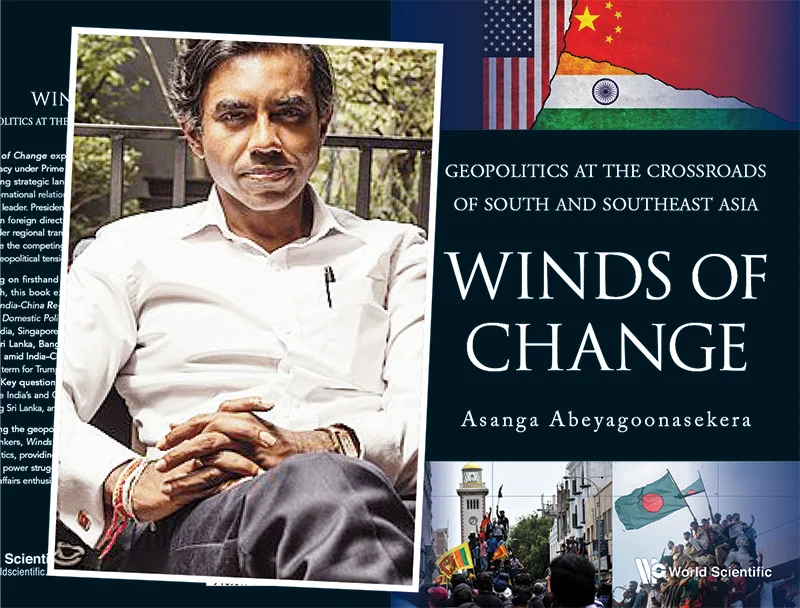
Did CIA chief William Burns visit Colombo in Feb 2023? Sri Lanka and the US refrained from formally confirming the visit. The Opposition sought confirmation of the then CIA Chief’s visit to Colombo in terms of the Right to Information Act but the Wickremesinghe-Rajapaksa government sidestepped the query. A former Republican congressman from Texas and Director of National Intelligence (2020–2021) John Ratcliffe succeeded Burns in late January 2025.
On the sheer weight of new evidence presented by Asanga Abeyagoonasekera’s ‘Winds of Change’, readers can get a clear picture of the forces that overthrew President Gotabaya Rajapaksa in 2022.
Even five years after the political upheaval, widely dubbed ‘Aragalaya,’ controversy surrounds the high-profile operation that forced wartime Defence Secretary Gotabaya Rajapaksa to literally run for his dear life.
Gotabaya Rajapaksa, formerly of the Army but a novice to party politics, comfortably won the 2019 November presidential election against the backdrop of the Easter Sunday carnage that caused uncertainty and suspicions among communities. The economic crisis, also clandestinely engineered from abroad, firstly by crippling vital worker remittances from abroad, almost from the onset of Gotabaya Rajapaksa’s presidency, overwhelmed the government and created the environment conducive for external intervention. Could it have been avoided if the government, that enjoyed a near two-thirds majority in Parliament, sought the help of the International Monetary Fund (IMF)?
The costly and well-funded book project, undertaken at the time Abeyagoonasekera was working on a governance diagnostic report for the IMF, in the wake of the change of government in Sri Lanka, meticulously examined the former Lieutenant Colonel’s ouster, taking into consideration regional as well as global developments. Abeyagoonasekera dealt efficiently and furiously with rapidly changing situations and developments before the unprecedented 03 January, 2026, US raid on Venezuela.
Lt. Col. (retd) Gotabaya Rajapaksa, for some unexplainable reason and a considerable time after the events, has chosen to blame his ouster on the United States. We cannot blame him either, by the way we have seen how other regime changes had been engineered, in our region, by Washington, since and before Gotabaya’s ouster. The accusation is extraordinary as Gotabaya Rajapaksa in his memoirs ‘The conspiracy to oust me from presidency’ refrained from naming the primary conspirator, though he clearly alluded to an international conspiracy.
April 8, 2019 meeting
Launched in March 2024, in the run-up to the presidential election that brought Anura Kumara Dissanayake (AKD) to power, almost in a dream ride, if not for the intervening outside evil actors, ‘The conspiracy to oust me from presidency’ discussed the international conspiracy, but conveniently failed to name the primary conspirator. What made the former President speak so candidly with Abeyagoonasekera, the founding Director-General of the national security think tank, the Institute of National Security Studies Sri Lanka (INSS), under the Ministry of Defence, from 2016 to 2020?
Abeyagoonasekera also served as Executive Director at the Lakshman Kadirgamar Institute (LKI), under the Ministry of Foreign Affairs (2011–2015), during Mahinda Rajapaksa’s second term as the President. The author, both precisely and furiously, dealt with issues. Readers may find very interesting quotes and they do give a feeling of the author’s general hostility towards the US, India, as well as to the US-India marriage of convenience. Those who sense so may end up thinking ‘Change of Winds’ being supportive of the Chinese strategy. Among the highly sensitive quotes that underlined the Indian approach were attributed to Indian Defence Secretary Sanjay Mitra. The author quoted Mitra as having declared: “We need the MRCC centre [Maritime Rescue Coordination Centre], and you cannot give it to another nation.” As pointed out by the author, it was not a request but an order given to Sri Lanka on 8 April, 2019, meant to prevent Sri Lanka from even considering a competing proposal from China. Against that background, the author, who had been present at that meeting at which the Sri Lanka delegation was led by then Defence Secretary Hemasiri Fernando, questioned the failure on the part of the delegations to take up the Easter Sunday attacks. Terrorists struck two weeks later. Implications were telling.
That particular quote reveals the circumstances India and the US operated here. No wonder the incumbent government does not want to discuss the secret defence MoUs it has entered into with India and the US as they would clearly reveal the sellout of our interests.
The following line says a lot about the circumstances under which Gotabaya Rajapaksa was removed: “In Singapore, a senior journalist recounted how Gotabaya Rajapaksa’s resignation was scripted, under duress, at a hotel, facilitated by a foreign motorcade.”
In the first Chapter that incisively dealt with the Belt and Road Initiative (BRI), the author was so lucky to secure an explosive quote from the ousted leader in an exclusive, hitherto unreported, interview in June 2024, a few months after the launch of Gotabaya Rajapaksa’s memoirs. The ex-President hadn’t minced his words when he alleged that the Central Intelligence Agency (CIA) orchestrated his removal. He also claimed that he had been under US surveillance throughout his presidency.
The ousted leader has confidently cleared India’s Research and Analysis Wing (RAW) of complicity in the operation. What made him call Indian National Security Advisor (NSA) Ajit Doval ‘a good man,’ in response to Abeyagoonasekera’s pointed query. Abeyagoonasekera quoted Gotabaya Rajapaksa as having said: “… he would never do such things.” The ex-President must have some reason to call Doval a good friend, regardless of intense pressure exerted on him and the Mahinda Rajapaksa government by the Indians to do away with large scale Chinese-funded projects. (Doval in late October last year declared “poor governance” was the reason behind uprisings that led to change of governments in Bangladesh, Nepal, and Sri Lanka over the period of past three-and-a-half years. The media quoted Doval as having said, during a function in New Delhi, that democracy and non-institutional methods of regime change in countries, such as Bangladesh, Sri Lanka and Nepal, created their own set of problems. That was the first time a senior Indian government official made remarks on Nepal’s government change, followed by the Gen Z uprising in early September, 2025.)
Gotabaya Rajapaksa also cleared the Chinese of seeking to oust him. It would be pertinent to mention that China reacted sternly when at the onset of the Gotabaya presidency, the President suggested the need to re-negotiate the Hambantota Port deal.
During the treacherous ‘Yahapalana’ administration (2015 to 2019) Gotabaya Rajapaksa told me how Doval had pressed him to halt not only the Colombo Port City project but to take back Hambantota Port as well. By then, the Chinese had twisted the arms of the Yahapalana leaders Mairthpala Sirisena and Ranil Wickremesinghe and secured the Hambantota Port on a 99-year lease in a one-sided USD 1.2 bn deal. The Colombo Port City project, that had been halted by the Yahapalana government, too, was resumed possibly under Chinese threat or for some money incentive.
Once Wijeyadasa Rajapakshe, PC, declared, at a hastily arranged media briefing at Sri Lanka Foundation (SLF), that Sri Lanka would be relentlessly targeted as long as the Chinese held the Hambantota Port. The writer was present at that media briefing.
Wijeyadasa Rajapakshe said so in the aftermath of the 2019 Easter Sunday carnage, while disclosing his abortive bid to convince the Yahapalana government to abrogate the Hambantota Port deal. Did the parliamentarian know something we were not aware of? The author’s assessment, regarding the Easter Sunday attacks, based on interviews with Chinese officials and scholars, is frightening and an acknowledgement of a possible Western role in Sri Lanka’s destabilisation plot.
The ousted leader, in his lengthy interview with Abeyagoonasekera, made some attention-grabbing comments on the then US Ambassador here, Julie Chung. The ex-President questioned a particular aspect of Chung’s conduct during the protest campaign but his decision not to reveal it all in his memoirs is a mystery. Perhaps, one of the most thought-provoking queries raised by Abeyagoonasekera is the rationale in Gotabaya Rajapaksa’s claim that he didn’t want to suppress the protest campaign by using force against the backdrop of his own declaration that the CIA orchestrated the project.
Author’s foray into parliamentary politics
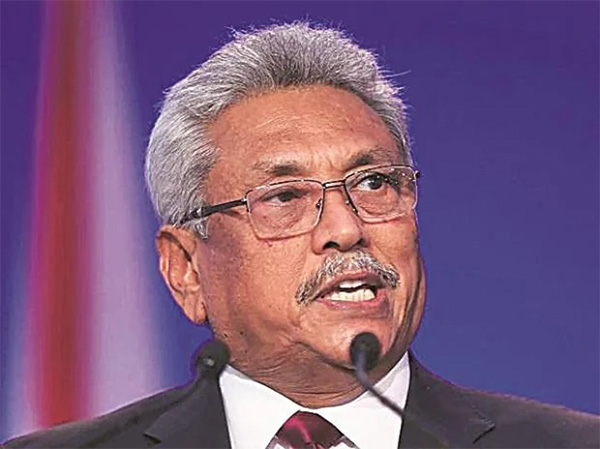
Gotabaya
For those genuinely interested in post-Chandrika Bandaranaike Kumaratunga developments, pertaining to international relations and geopolitics, may peruse ‘Winds of Change’ as the third of a trilogy. ‘Sri Lanka at Crossroads’ (2019) dealt with the Mahinda Rajapaksa period and ‘Conundrum of an Island’ (2021) discussed the treacherous Sirisena–Wickremesinghe alliance. The third in the series examined the end of the Sri Lanka Podujana Peramuna’s (SLPP) President Gotabaya Rajapaksa’s rule and the rise of Anura Kumara Dissanayake (AKD) whom the author described as a Marxist, though this writer is of the view the JVP and NPP leader AKD is not so. AKD has clearly aligned his administration with US-India while trying to sustain existing relationship with China.
Among Asanga Abeyagoonasekera’s other books were ‘Towards a Better World Order’ (2015) and ‘Teardrop Diplomacy: China’s Sri Lanka Foray’ (2023, Bloomsbury).
Had Abeyagoonasekera succeeded in his bid to launch a political career in 2015, the trilogy on Sri Lanka may not have materialised. Abeyagoonasekera contested the Gampaha district at the August 2015 parliamentary election on the UNP ticket but failed to garner sufficient preferences to secure a place in Parliament. That dealt a devastating setback to Abeyagoonasekera’s political ambitions, but the Wickremesinghe-Sirisena administration created the Institute of National Security Studies Sri Lanka (INSS), under the Ministry of Defence, for him. Abeyagoonasekera received the appointment as the founding Director-General of the national security think tank, from 2016 to 2020.
Several persons dealt with ‘Aragalaya’ (the late Prof. Nalin de Silva used to call it (Paragalaya) before Abeyagoonasekera though none of them examined the regional and global contexts so deeply, taking into consideration the relevant developments. Having read Wimal Weerawansa’s (Nine: The hidden story), Sena Thoradeniya’s (Galle Face Protest; Systems Change or Anarchy?). Mahinda Siriwardena’s (Sri Lanka’s Economic Revival – Reflection on the Journey from Crisis to Recovery) and Prof. Sunanda Maddumabandara’s (Aragalaye Balaya), the writer is of the opinion Abeyagoonasekera dealt with the period in question as an incisive insider.
Abeyagoonasekera, as a person who left the country, under duress, in 2021, painted a frightening picture of a country with a small and vulnerable economy trapped in major global rivalries. The former government servant attributed his self–imposed exile to two issues.
The first was the 2019 Easter Sunday carnage. Why did the Wickremesinghe-Sirisena government ignore the warning issued by Abeyagoonasekera, in his capacity as DG INSS, in respect of the Easter Sunday bombing campaign? There is absolutely no ambiguity at all in his claim. Abeyagoonasekera insists that he alerted the government four months before the National Thowheed Jamath (NTJ) bombers struck. The bottom line is that Abeyagoonasekera had issued the warning several weeks before India did but those at the helm of that inept administration chose to turn a blind eye.
The second was the impending economic crisis that engulfed the country in 2022. Abeyagoonasekera is deeply bitter about his arrest on 21 July, 2024, at the Bandaranaike International Airport (BIA) over an alleged IRD –related offence as reported at that time, especially because he was returning home to visit his sick mother.
Asanga’s father Ossie, a member of Parliament and controversial figure, was killed in an LTTE suicide attack at Thotalanga in late Oct. 1994. The Chairman and leader of Sri Lanka Mahajana Pakshaya had been on stage with then UNP presidential election candidate Gamini Dissanayake when the woman suicide cadre blasted herself. The assassination was meant to ensure Kumaratunga’s victory. The LTTE probably felt that it could manipulate Kumaratunga than the experienced Dissanayake who may have had reached some sort of consensus with New Delhi on how to deal with the LTTE.
Let me reproduce a question posed to Asanga Abeyagoonasekera and his response in ‘Winds of Change’ as some may believe that the author is holding something back. “Didn’t they listen?” a US intelligence officer had asked me incredulously after the bombings. Years later, during my role as a technical advisor for the International Monetary Fund (IMF) amid Sri Lanka’s collapse, the question resurfaced: “How did you foresee the collapse of a powerful regime with a majority in parliament?” My answer remained the same—patterns. Rigorously gathered data and relentless analysis reveal the arcs of history before they unfold.
Perhaps, readers may find what former cashiered Flying Officer Keerthi Ratnayake had to say about ‘Aragalaya’ and related developments (https://island.lk/ex-slaf-officer-sheds-light-on-developments-leading-to-aragalaya/)
Bombshell claim
Essentially, Abeyagoonasekera, on the basis of his exclusive and lengthy interview with former President Gotabaya Rajapaksa, confirmed what Wimal Weerawansa and Sena Thoradeniya alleged that the US spearheaded the operation.
But Prof. Maddumabandara, a confidant of first post-Aragalaya President Ranil Wickremesinghe has bared the direct Indian involvement in the regime change operation. In spite of Gotabaya Rajapaksa confidently clearing Indian NSA Doval of complicity in his ouster, Prof. Maddumabandara is on record as having said that the then Indian High Commissioner here Gopal Baglay put pressure on Speaker Mahinda Yapa Abeywardena to take over the government for an interim period. (https://island.lk/dovals-questionable-regional-stock-taking/)
Obviously, the US and India worked together on the Sri Lanka regime change operation. That is the undeniable truth. India wanted to thwart Wickremesinghe receiving the presidency by bringing in Speaker Abeywardena. That move went awry in spite of some sections of both Buddhist and Catholic clergy throwing their weight behind New Delhi.
The 2022 violent regime change operation cannot be discussed without taking into consideration the US-led project that also involved the UNP, JVP and TNA to engineer retired General Sarath Fonseka’s victory at the 2010 presidential election and their backing for turncoat Maithripala Sirisena at the 2015 presidential election.
The section, titled ‘Echoes of Crisis from Sri Lanka to Bangladesh: South Asia’s Struggle in a Polycrisis’, is riveting and underscores the complexity of the situation and fragility of governments. Executive power and undisputable majorities in Parliament seems irrelevant as external powers intervene thereby making the electoral system redundant.
Having meticulously compared the overthrowing of Gotabaya Rajapaksa and Bangladesh’s Premier Sheikh Hasina, the author condemned them for their alleged failures and brutality. Abeyagoonasekera stated: “When the military sides with the protesters, as it did in Sri Lanka and now in Bangladesh, it reveals the rulers’ vulnerabilities.” The author unmercifully chided the former President for seeking refuge in the West while alleging direct CIA role in his ouster. But that may have spared his life. Had he sought a lifeline from the Chinese so late the situation could have taken a turn for worse.
The comment that had been attributed to Gotabaya Rajapaksa seemed to belittle Ranil Wickremesinghe who accepted the challenge of becoming the Premier in May 2022 and then chosen by the ruling SLPP to complete the remainder of Gotabaya Rajapaksa’s five-year term. Ranil was definitely seen as an opportunistic vulture who backed ‘Aragalaya’ without any qualms till he saw an opening for himself out of the chaos.
On Wickremesinghe’s path
Abeyagoonasekera discussed the joint US-Indian strategy pertaining to Sri Lanka. Whatever the National People’s Power (NPP) and its President say, the current dispensation is continuing Wickremesinghe’s policy as pointed out by the author. In fact, this government appears to be ready even to go beyond Wickremesinghe’s understanding with New Delhi. The Memorandum of Understanding (MoU) on defence and the selling of the controlling interests of the Colombo Dockyard Limited (CDL) to India, mid last year, must have surprised even those who always pushed for enhanced relations at all levels.
The economic collapse that resulted in political upheaval has given New Delhi the perfect opportunity to consolidate its position here. Uncomplimentary comments on current Indian High Commissioner Santosh Jha in ‘Winds of Change’ have to be discussed, paying attention to Sri Lanka’s growing dependence and alleged clandestine activities of India’s Research and Analysis Wing (RAW). Abeyagoonasekera seemed to have no qualms in referring to RAW’s hand in 2019 Easter Sunday carnage.
Overall ‘Winds of Change’ encourages, inspires and confirms suspicions about US and Indian intelligence services and underscores the responsibility of those in power to be extra cautious. But, in the case of smaller and weaker economies, such as Sri Lanka still struggling to overcome the economic crisis, there seems to be no solution. Not only India and the US, the Chinese, too, pursue their agenda here unimpeded. Utilisation of political parties, represented in Parliament, selected individuals, and media, in the Chinese efforts, are obvious. Once parliamentarian Wijeyadasa Rajapakshe raised the Chinese interventions in Sri Lanka. He questioned the Parliament receiving about 240 personal laptops for all parliamentarians and top officials. The then UNPer told the writer his decision not to accept the laptop paid for by China. Perhaps, he is the only Sri Lankan politician to have written a strongly worded letter to Chinese leader Xi warning against high profile Chinese strategy.
Winds of Change
is available at
Vijitha Yapa and Sarasavi
By Shamindra Ferdinando
Midweek Review
Beginning of another ‘White Supremacist’ World Order?

 Donald Trump’s complete lack of intelligence, empathy and common sense have become more apparent during the current term of his presidency. Ordinarily, a country’s wish to self-destruct as the United States seemingly does at present, and as the violence against US citizens and immigrants alike at the hands of federal authorities have shown in Minnesota, can be callously considered the business of that country. If the Trumpian imbecility was unfolding in Sri Lanka, anywhere else in South Asia or some other country of the purported Third World, the so-called World Order, led by the United States, would be preaching to us the values of democracy and human rights. But what happens when the actions of a powerful country, such as the United States, engulfs in the ensuing flames the rest of us? Trump and his madness then necessarily become our business, too, because combined with the military and economic power of the United States and its government’s proven lack of empathy for its own people, and the rest of the world, is quite literally a matter of global survival. Besides, one of the ‘positive’ outcomes of the Trumpian madness, as a friend observed recently, is that “he has single-handedly exposed and destroyed the fiction of ‘Western Civilisation’, including the pretenses of Europe.”
Donald Trump’s complete lack of intelligence, empathy and common sense have become more apparent during the current term of his presidency. Ordinarily, a country’s wish to self-destruct as the United States seemingly does at present, and as the violence against US citizens and immigrants alike at the hands of federal authorities have shown in Minnesota, can be callously considered the business of that country. If the Trumpian imbecility was unfolding in Sri Lanka, anywhere else in South Asia or some other country of the purported Third World, the so-called World Order, led by the United States, would be preaching to us the values of democracy and human rights. But what happens when the actions of a powerful country, such as the United States, engulfs in the ensuing flames the rest of us? Trump and his madness then necessarily become our business, too, because combined with the military and economic power of the United States and its government’s proven lack of empathy for its own people, and the rest of the world, is quite literally a matter of global survival. Besides, one of the ‘positive’ outcomes of the Trumpian madness, as a friend observed recently, is that “he has single-handedly exposed and destroyed the fiction of ‘Western Civilisation’, including the pretenses of Europe.”
It is in this context that the speech delivered by the Canadian Prime Minister, Mark Carney, at the World Economic Forum, in Davos, on 20 January, 2026, deserves attention. It was an elegant speech, a slap in the face of Trump and his policies, the articulation of the need for global directional change, all in one. But, pertinently, it was also a speech that did not clearly accept responsibility for the current world (dis)order which Carney says needs to change. The reality of that need, however, was overly reemphasised by Trump himself during his meandering, arrogant and incohesive speech delivered a day later, spanning over one hour.
My interest is in what Carney did not specifically say in his speech: who would constitute the new world order, who would be its leaders and why should we believe it would be any different from the present one?
Speaking in French, Carney observed that he was talking about “a rupture in the world order, the end of a pleasant fiction and the beginning of a harsh reality, where geopolitics, where the large, main power, geopolitics, is submitted to no limits, no constraints.” He was, of course, responding to the vulgar script for global domination put in place by the Trumpian United States, given Trump’s declared interest in seeing Canada as part of the United States, his avarice for Greenland, not to mention his already concluded grab for Venezuelan oil. But within this scenario, bound by ‘no limits’ and ‘no constraints’ he was also talking of Russia and China albeit in a coded language.
He reiterated, “that the other countries, especially intermediate powers like Canada, are not powerless. They have the capacity to build a new order that encompasses our values, such as respect for human rights, sustainable development, solidarity, sovereignty and territorial integrity of the various states. The power of the less power starts with honesty.”
Who could disagree with Carney? His words are a refreshing whiff of fresh air in the intellectual wasteland that is the Trumpian Oval Office and the current world order it prevails over. But where has been the ‘honesty’ of the less powerful in the specific situation where he equates Canada itself within this spectrum? He tells us that “the rules-based order is fading, that the strong can do what they can, and the weak must suffer what they must.”
That is stating the obvious. We have known this for decades by experience. Long before Canada’s relative silence with regard to Trump’s and US’ facilitation of the assault on Palestine and the massacre of its people, and the US President’s economic grab in Venezuela and the kidnapping of that country’s President and his wife, Canada’s own chorus in the world order that Carney now critiques has been embellished by silence or – even worse – by chords written by the global dominance orchestra of the United States.
He says the fading of the rules-based order has occurred because of the “strong tendency for countries to go along, to get along, to accommodate, to avoid trouble, to hope that compliance will buy safety.” Canada fits this description better than most other nations I can think of. But would Canada, along with other nations among the silent majority within the ‘intermediate powers’ take the responsibility for the mess in the world precisely that silence has directly led to creating? Who will pay for the pain many nations have endured in the prevailing world order? Will Canada lead the way in the new world order in doing this?
Carney further articulates that “for decades, countries like Canada prospered under what we called the rules-based international order. We joined its institutions, we praised its principles, we benefited from its predictability. And because of that, we could pursue values-based foreign policies under its protection.”
But this is not true, is it? Countries like Canada prospered not merely because of the stability of rules of the world order, but because they opted for silence when they should not have. The rupture and the chaos in the world order Carney now critiques and is insanely led by Trump today is not merely the latter’s creation. It has been co-authored for decades by countries such as Canada, France, the United Kingdom to mention just a few who also regularly chant the twin-mantras of human rights and democracy. Trump is merely the latest and the most vocal proponent of the nastiness of that World Order.
It is not that Carney is unaware of this unpleasant reality. He accepts that “the story of the international rules-based order was partially false, that the strongest would exempt themselves when convenient, that trade rules were enforced asymmetrically. And we knew that international law applied with varying rigour depending on the identity of the accused or the victim.”
While Canada seems to be coming to terms with this reality only now, countries like Sri Lanka and others in similarly disempowered positions in this world order have experienced this for decades, because, as I have outlined earlier, Canada et al have been complicit sustainers of the now demonised and demonic world order.
It is not that I disagree with the basic description Carney has painted of the status of the world. But from personal experience and from the perspective of a citizen from a powerless country, I simply do not trust those who preach ‘the gospel of the good’ not as a matter of principle, but only when the going gets tough for them.
At this rather late stage, Carney says, Canada is “amongst the first to hear the wake-up call, leading us to fundamentally shift our strategic posture.” Unfortunately, we, the people of countries who had to dance to the tunes of the world order led by the First World, have heard it for years, with no one listening to us when our discomforts were articulated. Now, Carney wants ‘middle powers’ or ‘intermediate powers’ within which he also locates Canada, “to live the truth?” For him, the truth means “naming reality” as it exists; “acting consistently” towards all in the world; “applying the same standards to allies and rivals” and “building what we claim to believe in, rather than waiting for the old order to be restored.” This appears to be the operational mantra for the new world order he is envisioning in which he sees Canada as a legitimate leader merely due to its late wakeup call.
He goes on to give a list of things Canada has done locally and globally and concludes by saying, “we have a recognition of what’s happening and a determination to act accordingly. We understand that this rupture calls for more than adaptation. It calls for honesty about the world as it is.” He goes on to say Canada also has “the capacity to stop pretending, to name reality, to build our strength at home and to act together.” He notes this is “Canada’s path. We choose it openly and confidently, and it is a path wide open to any country willing to take it with us.” Quite simply, this a leadership pitch for a new world order with Canada at its helm.
Without being overly cynical, this sounds very familiar, not too dissimilar to what USAID and Voice of America preached to the world; not too dissimilar to what the propaganda arms of the Soviet Union and the Chinese Communist Party used to preach in our own languages when we were growing up. It is difficult to buy this argument and accept Canadian and middle country leadership for the new world order when they have been consistently part of the problem of the old one and its excuses for institutionalised double standards practiced by international organisations such as the likes of the United Nations, the World Bank, the International Monetary Fund and other hegemonic entities that have catered to the whims of that world order.
As far as Canada is concerned, it is evident that it has suddenly woken up only due to an existential threat at home projected from across its southern border and Trump’s threats against the Danish territory of Greenland. When Gaza was battered, and Venezuela was raped, there was no audible clarion call. Therefore, there is no real desire for democracy or human rights in its true form, but a convenient and strategic interest in creating a new ‘white supremacist’ world order in the same persona as before, but this time led by a new white warrior instead. The rest of us would be mere followers, nodding our heads as expected as was the case before.
As the 20th century American standup comedian Lenny Bruce once said, “never trust a preacher with more than two suits.” Mr. Carney, Canada along with the so-called middle powers and the lapsed colonialists have way more than two suits, and we have seen them all.
Midweek Review
The MAD Spectre
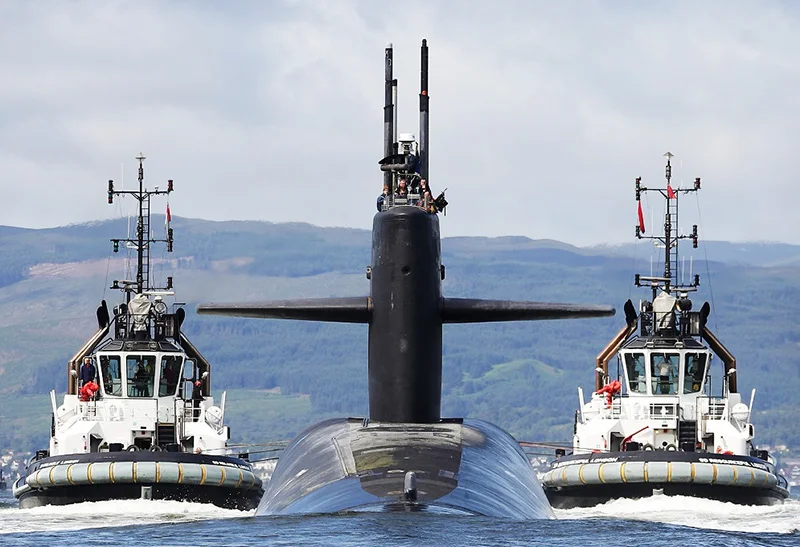
Lo and behold the dangerous doings,
Of our most rational of animals,
Said to be the pride of the natural order,
Who stands on its head Perennial Wisdom,
Preached by the likes of Plato and Confucius,
Now vexing the earth and international waters,
With nuke-armed subs and other lethal weapons,
But giving fresh life to the Balance of Terror,
And the spectre of Mutually Assured Destruction.
By Lynn Ockersz
-

 Opinion6 days ago
Opinion6 days agoSri Lanka, the Stars,and statesmen
-

 Business7 days ago
Business7 days agoClimate risks, poverty, and recovery financing in focus at CEPA policy panel
-

 Business5 days ago
Business5 days agoHayleys Mobility ushering in a new era of premium sustainable mobility
-

 Business2 days ago
Business2 days agoSLIM-Kantar People’s Awards 2026 to recognise Sri Lanka’s most trusted brands and personalities
-

 Business5 days ago
Business5 days agoAdvice Lab unveils new 13,000+ sqft office, marking major expansion in financial services BPO to Australia
-

 Business5 days ago
Business5 days agoArpico NextGen Mattress gains recognition for innovation
-

 Business4 days ago
Business4 days agoAltair issues over 100+ title deeds post ownership change
-

 Business4 days ago
Business4 days agoSri Lanka opens first country pavilion at London exhibition

